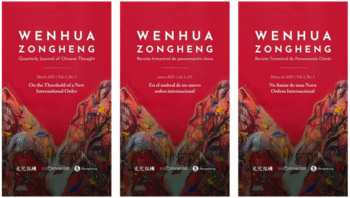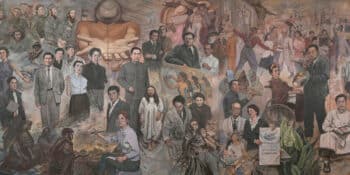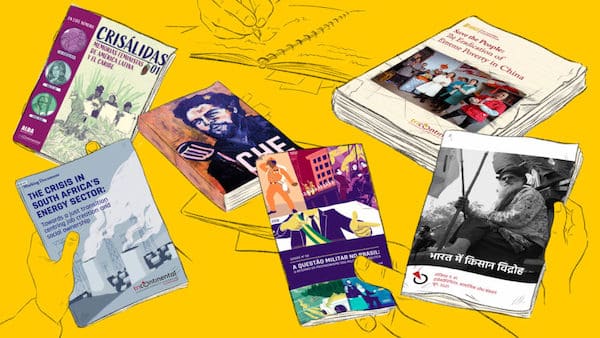Dear friends,
Greetings from the desk of Tricontinental: Institute for Social Research.
I am grateful to you for reading this newsletter, which has been coming to you since March 2018 and which now—thanks to the efforts of our movements—reaches over a million people. Our first newsletter posed a problem that remains at the heart of our institute’s work:
The Left has before us a serious challenge: people think that we are good and sensitive people, but that we are utopian and fail to provide reasonable answers to practical problems. We have to overcome this penalty. We have to show that radical thinking is not merely utopian (and has no place in reality), but that it attempts to solve practical challenges given the constraints of property and power. It has to show, more importantly, how certain problems cannot be solved within these constraints and require more ambitious transformations of the political and economic system. This kind of thinking—guided by political and social movements—will be at the heart of the institute.
Over the course of the past sixty-two months, we have tried our best to hold fast to this mission. To this end, we set for ourselves a series of objectives:
- To bridge the gap between movements and intellectual institutions.
- To bridge the gap between movements across the planet.
- To amplify the voices of the new intellectuals who lead these movements.
- To elaborate the theories that are often implicit in these movements.
- To reclaim the histories of socialism and national liberation.
 These objectives ground our work. We hope that what we have researched and produced has been useful to those committed to strengthening our movements and advancing towards a more rational social order.
These objectives ground our work. We hope that what we have researched and produced has been useful to those committed to strengthening our movements and advancing towards a more rational social order.
Over the past few years, we have become increasingly alarmed by the serious tensions that have been imposed on the world, largely by the United States government as it prosecutes a New Cold War against China. This hybrid war includes a trade war coupled with an increase in U.S. militarisation across the Pacific Rim as well as an information war that demonises China and imposes a virtual blockade of Chinese intellectual thought. As a research institute committed to advancing global collaboration, we began a dialogue with Chinese intellectuals and academic institutions. One of the results of this dialogue, which we announced in March 2023, is the quarterly production of an international edition of the important Chinese intellectual journal Wenhua Zongheng (文化纵横) in English, Portuguese, and Spanish (and soon, German). In the first issue, On the Threshold of a New International Order, Yang Ping, the editor of the Chinese edition of Wenhua Zongheng, wrote:
While the United States today rallies the Western camp under the banner of ‘democracy versus authoritarianism’, China must clearly uphold the flag of peace and development, uniting and leading the vast developing world whilst appealing to and persuading more European states to join this cause.
 Yang Ping’s view of our contemporary reality offers readers a window into the discussions taking place amongst Chinese intellectuals and a space for those of us outside of China to engage with these discussions. Reading the four essays in this issue showed me, for instance, how much those of us outside China share with Chinese intellectuals in our analyses of the current threats facing our planet and the need to emphasise not only a peace plan—which the Chinese government proposed through its 12-point plan regarding the war in Ukraine—but also a development agenda. It is worth comparing the general orientation of the first international issue of Wenhua Zongheng with Eight Contradictions of the Imperialist ‘Rules Based Order’ (Studies on Contemporary Dilemmas no. 3, March 2023), where we wrote about the need to link peace and development, which would require expanding a ‘zone of peace’ and addressing people’s everyday problems.
Yang Ping’s view of our contemporary reality offers readers a window into the discussions taking place amongst Chinese intellectuals and a space for those of us outside of China to engage with these discussions. Reading the four essays in this issue showed me, for instance, how much those of us outside China share with Chinese intellectuals in our analyses of the current threats facing our planet and the need to emphasise not only a peace plan—which the Chinese government proposed through its 12-point plan regarding the war in Ukraine—but also a development agenda. It is worth comparing the general orientation of the first international issue of Wenhua Zongheng with Eight Contradictions of the Imperialist ‘Rules Based Order’ (Studies on Contemporary Dilemmas no. 3, March 2023), where we wrote about the need to link peace and development, which would require expanding a ‘zone of peace’ and addressing people’s everyday problems.
In Eight Contradictions, we wrote that ‘the capitalist development model is failing to serve the interests of the majority’. In our recent dossier no. 63 (April 2023), Life or Debt: The Stranglehold of Neocolonialism and Africa’s Search for Alternatives, we documented the failures of the International Monetary Fund’s debt-austerity model. This model denies the historical theft of developing countries’ resources and rejects any analysis that attributes the reproduction of inequality in these countries to high rates of exploitation. Instead, the loans that it offers cash-strapped developing countries come with conditionalities that further impoverish these countries, which effectively have no choice but to borrow more money to pay off the interest on their debts and finance the most necessary state functions. During the second year of the pandemic (2021), thirteen of the fifteen IMF loan programmes required the countries that had taken loans from them to impose taxes on food and fuel and cut vital public services in order to service their debts. It is worth noting that the following year, China announced that it would waive twenty-three interest-free loans that it had given to seventeen African countries. This decision reflects a long-term trend in China’s loan management, as the country is estimated to have forgiven between $45 million and $610 million in lending to the continent over the last two decades.

Inji Effaltoun (Egypt), The Prisoners, 1957.
In July, our institute will release a dossier on the need for a new development theory paradigm and another in August on a critique of dependency theory. Both texts will advance our thinking about the failure of the capitalist model to serve the interests of the majority and the need for a new development architecture that includes an engagement with the broad policy framework of the New Development (BRICS) Bank.
At Tricontinental: Institute for Social Research, we have been closely watching the expanding IMF-driven debt crisis, which has converted the idea of ‘financing for development’ into ‘financing for debt servicing’. But financial debt is only one of at least three major deficits that currently bedevil the Global South, the other two being deficits in science and technology as well as political integrity.
In terms of science and technology, the IMF-driven austerity agenda has forced the evisceration of higher education in most of the poorer nations. In Nepal, for instance, the IMF has routinely called upon the government to freeze its public-sector wage bill, which has resulted in a catastrophic decrease in full-time school teachers and an increase in precarious teachers. As secondary schools and universities suffer from austerity budgets, states’ ability to train their youth declines and, consequently, so does their ability to build their scientific and technological capacity. This deficit increases their dependence on foreign states and corporations for the technological inputs needed to increase their productivity. The poorer nations’ lack of capacity to build their own science and technology sectors leaves them unable to advance domestic production, struggling to earn foreign exchange as they are only able to export primary commodities for lower prices on the international market. As UNESCO notes, ‘sub-Saharan Africa is home to 14% of the world’s people but only 0.7% of the world’s researchers, as of 2018’—far below what we see in other parts of the world. In comparison, 23.5% of the world’s researchers come from the European Union, 21.1% come from China, and 16.2% come from the United States. At Tricontinental: Institute for Social Research, we are building a research agenda to better understand the character of this science and technology deficit and how this deficit can be overcome.

Tadesse Mesfin (Ethiopia), Pillars of Life: Market Day, 2018.
The third major deficit is difficult to define, but, for now, let us call it a deficit of political integrity. Most countries of the Global South simply lack the political and administrative capacity to manage relations with foreign governments and corporations, as evidenced by the paucity of legal experts to properly read and write contracts. Furthermore, there is a very poor analysis of what is otherwise called ‘corruption’, which neglects the low wages paid to public officials and the lack of a moral political project for these officials. As we write in dossier no. 63, we operate with ‘the knowledge that the permanent debt crisis besieging the poorer nations… it is not fully a consequence of governments’ mismanagement of finances or deep-rooted corruption’. Nonetheless, the idea of corruption is used as a stick to beat poor countries, without any self-awareness of the internalised transaction costs in the richer states (where enormous corporate political donations, coupled with the revolving door between high-level government positions and private-sector employment, often serve as a substitute for overt bribes). Next year, we will provide an assessment of the debate around the integrity of public institutions.
In a later newsletter, I will describe our work on studies of the working class and peasantry, a project that includes a focus on the attack on working-class culture by mafias, religious organisations, and drugs, as well as through the escalation of social militarisation. But that is for another day.
For now, if you wish to support our institute, please do so here.
Warmly,
Vijay

